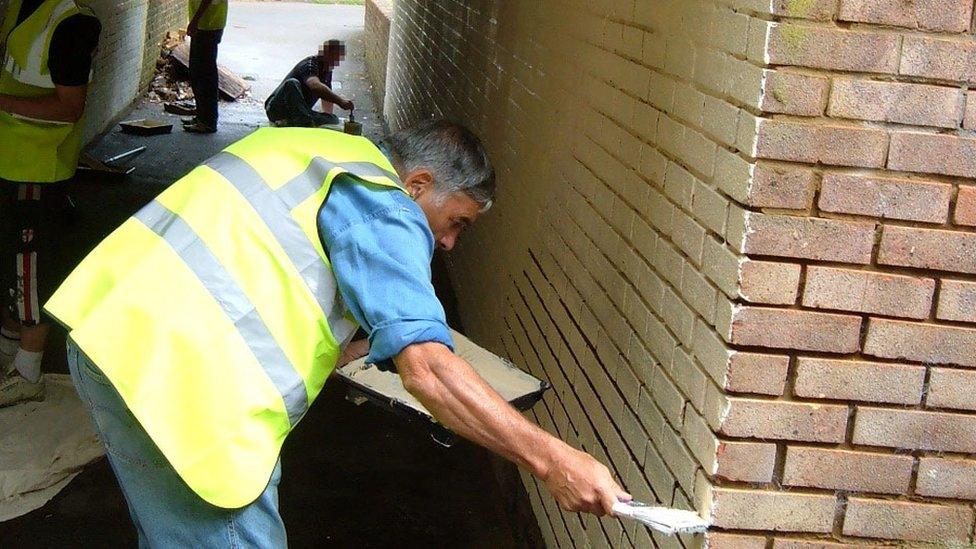Why are the numbers of community sentences falling?
- Published

Community sentences have been often held up by politicians in England and Wales as a viable substitute for a spell behind bars. So why is the number of offenders subject to them falling?
Twelve years ago the judge in charge of the criminal courts in England and Wales was photographed in a pair of jeans, plastic gloves and carrying a garden spade.
Hoping to show that community sentences were hard work and could be an effective alternative to imprisonment, Lord Phillips of Worth Matravers, then the Lord Chief Justice, had joined a group of offenders ordered by the courts to clean up a council estate.
Since then, a succession of justice secretaries, both Labour and Conservative, have set out the case for community penalties. Last month, David Lidington, who held the post for six months until the latest reshuffle, said prison should be a "last resort".
In a major speech on penal policy, Mr Lidington said: "We need to look constantly at how to ensure that we have a range of tough community sentences."
But the evidence suggests that in England and Wales they're being used less often than they were a decade ago.
In the 12 months to the end of June 2007, 191,000 people received community orders out of almost 1.4 million who were sentenced - almost 14% of the total.
Ten years later, that figure had dropped to just over 8%, external - with 99,000 required to serve a community sentence out of 1.2 million offenders sentenced.
At the same time, the figures, from the Ministry of Justice, show a slight increase in rates of imprisonment, to more than 7%, and a substantial rise in the use of fines, from 67% to 74%.

Lord Phillips joined a group of offenders in 2006 to highlight his support for community sentences
Some experts argue that the decrease in community sentences is because judges are making more use of suspended prison terms, where an offender walks free but is told that if they commit a further offence within a specified period, of up to two years, they'll be sent to jail.
Conditions can be attached to suspended sentences, such as a requirement to complete substance misuse or offending behaviour programmes, just as they can be to community orders.
Compared with 2007, 17,000 more suspended sentences were handed down by the courts. And while that might account for some of the drop in the use of community sentences, it goes nowhere near to explaining all of it.
One factor undoubtedly affecting the decline is a shift in the type of offences dealt with by police. Community sentences are generally reserved for less serious crimes, particularly theft.
But data from the Office for National Statistics, external show that between 2007 and 2017 there was a 26% fall in thefts recorded by police while drug offences, that make up the second highest number of community orders, went down 32%.
In contrast, there was a 51% increase in police-recorded violence and a 131% rise in sexual offences - crime types which are less likely to lead to a community penalty and may instead attract a spell behind bars.
Indeed prison, in spite of the well-documented problems of staff shortages, violence and drug taking, has the benefit of being understood by judges and magistrates.

There has been an increase in some of the types of crime more likely to lead to a prison term
"They have a sense of prison," says Harvey Redgrave, who co-authored a report on community sentences for Crest Advisory,, external an independent consultancy which focuses on criminal justice and policing. "Judges just don't have that same intuitive understanding of community sentencing," he adds.
Crest commissioned a survey of magistrates for its report which found that 37% weren't confident that community terms were an effective alternative to custody and 65% didn't think they reduced crime.
Mr Redgrave claims that's partly because opportunities for magistrates, who deal with the majority of criminal cases, to learn how community sentences work have been scaled back because of budget cuts.
"Magistrates we spoke to said 'I need to get a few days' training and I don't [receive it] any more'," he says.
Convincing magistrates and judges that community sentences are effective would of course help boost take-up - but the sentencing statistics indicate that those who hand down sentences are doubtful about their use.
The latest data - for the last quarter of 2015, external - show that the proportion of adult prisoners convicted or cautioned for a fresh offence was 49%, with recidivism rates declining the longer an inmate spent in jail. The figure for those subject to community or suspended sentence orders was 34%.
But the reoffending statistics aren't directly comparable. Although both cover 12 months, the community sentencing reoffending period starts from when a court order is made and therefore includes the time offenders are subject to the sentence: imprisonment reoffending levels are calculated from the time of release.
Offenders who are jailed also tend to be more serious, dangerous or prolific criminals with more entrenched problems, than those on community orders.
There's emerging evidence, too, from a series of highly critical reports by the Chief Inspector of Probation, Dame Glenys Stacey, that community sentence provision is increasingly patchy, after the part-privatisation of the system in 2015.
Dame Glenys's annual review, external highlighted that thousands of offenders were being monitored by a phone call every six weeks and some staff were responsible for 200 cases at a time.

Dame Glenys Stacey has said remote monitoring of offenders in England is "not acceptable"
Although there are pockets of good practice and a dedicated workforce, the findings provided another reason why community sentences appear to be in decline.
Their real advantage, of course, is that they don't cost as much as a custodial sentence. The Ministry of Justice estimates that it spends about £35,000 on each prison place every year. The cost of a community order, based on figures from probation trusts in 2012, is a fraction of that - around £4,000, though it's likely to have gone up since then.
That's why, in the coming months, there will be renewed efforts to bolster confidence in community sentencing. Developments in electronic tagging provide opportunities for more offenders to be supervised, without having to be behind bars.
The Scottish government has gone down that road already, with a "presumption" against imposing jail terms of fewer than three months which it is planning to extend to 12 months.
But in England and Wales, despite those efforts stretching back to 2006, to convince the public that community sentences aren't soft, there remains a reliance on "doing time".
- Published19 October 2017

- Published24 January 2019
